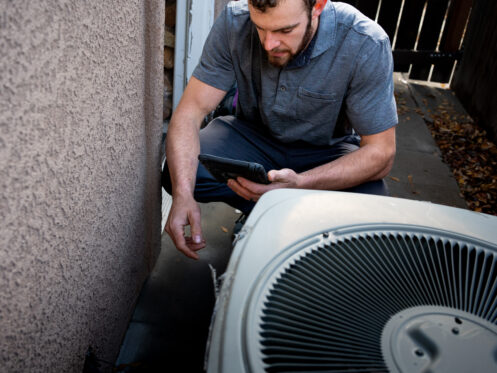Even though fixing your HVAC system on your own might save you money and give you a sense of accomplishment, doing it wrong can be incredibly costly. This is why professional repairs make more sense and end up being the more cost-effective way to address HVAC problems.
The Potential for Costly Damage
Misunderstanding or failing to address the root causes of HVAC problems is a common issue with DIY repairs. For instance, an amateur might replace a broken part without identifying and fixing underlying issues such as an electrical short or refrigerant leak, which can worsen the problem or cause it to recur. Additionally, do-it-yourselfers risk using incorrect equipment or techniques, potentially making the problem worse. Such mistakes can end up costing more than the initial savings from DIY repairs. Accurate diagnosis and repair of HVAC systems require specialized training and expertise.
Safety Hazards Associated With DIY Repairs
The improper handling of electrical components, high-pressure refrigerants and complicated mechanical elements in HVAC systems pose major safety risks. Dangers like electrical shocks, burns from hot components and injuries from sharp edges or moving parts are real possibilities when people try to fix things on their own. Mishandling refrigerants can lead to harmful chemical exposure or environmental damage, so it’s important to have the right training and tools for the job.
Impact on Warranty Coverage
Warranty repairs are typically subject to certain limitations and conditions, such as having repairs done by qualified technicians only. Repairs performed on your own can invalidate these warranties, requiring you to pay for any future repairs or replacements. The cost of repairs could end up costing you thousands of dollars that you otherwise would not have had to pay for if you hadn’t invalidated the warranty by attempting the repairs yourself.
Legal and Compliance Issues
Local building laws and regulations are in place to make sure that HVAC repairs are safe and efficient. Do-it-yourself repairs run the risk of breaking these codes and getting you fined or in trouble with the law. As an example, to guarantee that specific HVAC repairs are up to code, they may necessitate inspections or permits. Legal ramifications or expensive rework to bring the system up to code could emerge from failing to comply with these rules.
Incorrect Diagnosis of HVAC Issues
Repairing HVAC systems on your own without training could result in a wrong diagnosis. A homeowner may make pointless and ineffective repairs, for instance, if they mistake a thermostat problem for a compressor problem. Misdiagnosis not only causes unnecessary expenditure of time and energy but also increases the risk of additional harm should the underlying issue go unaddressed. To properly diagnose and fix HVAC problems, it is best to call in experts who have the necessary training and diagnostic equipment.
Quality of Replacement Parts
An HVAC system’s efficiency and lifespan are heavily dependent on the quality of its replacement parts. When doing repairs on your own, you could have to rely on parts from a variety of sources, and those parts might not be of the best quality. System inefficiencies, early failure and safety concerns might result from using parts that are either incompatible or of low quality. A professional HVAC technician will have access to quality parts that match your system.
Potential for Increased Energy Costs
If you try to fix your HVAC system on your own but fail, you can end up with inefficient operation and increased energy costs. Incorrect component installation or calibration, for example, could make the system work harder than it needs to, which in turn increases energy consumption. These inefficiencies have the potential to greatly increase your energy bills over time.
Risk of Mold Growth
Excess moisture can collect, fostering the growth of mold, if do-it-yourself repairs do not resolve fundamental HVAC problems like leaks or inadequate drainage. Mold is a major contributor to poor indoor air quality and a known allergen and respiratory problem for many people. Also, getting rid of mold can be a real pain, not to mention expensive and complicated. This is why it’s usually best left to the pros.
Time and Effort vs. Professional Service
Fixing HVAC systems on your own is a huge undertaking that demands a lot of energy and time. It can be physically and mentally taxing to go through the process of identifying problems, finding replacement parts and fixing them. In the case of complicated repairs or those requiring specialist tools, the time invested by many homeowners may exceed the benefits. By swiftly identifying and fixing problems, professional HVAC technicians provide a time-efficient solution, freeing you to attend to other matters.
Long-Term Effects on HVAC System Performance
If you fix your HVAC system incorrectly, it will affect its long-term performance. Incorrect installations and mismatched components are two examples of issues that might cause difficulties or inefficiencies. All these problems add up over time, which shortens the system’s lifespan and makes it more prone to breaking down. This means you might save some money at first by doing the repair on your own, but if it hinders the HVAC system’s performance, you’ll end up spending more money on energy consumption and any additional required repairs.
Safe HVAC Repairs and Maintenance for DIYers
There are three basic HVAC repair and maintenance tasks that are generally considered safe for DIYers: changing air filters, inspecting thermostat settings and cleaning air vents.
For safety reasons, you should always unplug the system before changing the filter. After disconnecting the system, locate the filter housing and remove the old filter. Put in the replacement filter, making sure it fits snugly and faces the right way so air can flow through it. You can then put the cover back on the compartment and power on the system again.
To inspect the thermostat’s settings, ensure that the temperature matches your desired comfort level. Then check for any programming or sensor discrepancies.
Cleaning air vents is simple. You can use a vacuum or duster to remove dust and debris, which helps improve airflow and system efficiency.
Be sure to use the right tools for the job, and always wear protective gear, such as goggles and gloves. You can learn your way around your HVAC system by studying its parts and looking for specific instructions in the handbook that came with it.
When to Call a Professional HVAC Technician
It is critical to know when to contact a professional HVAC technician to keep your HVAC system in good working order. A skilled expert is usually the best choice for complex fixes that involve novel concerns or substantial system failures. If you come into issues that go beyond routine maintenance, it’s a good idea to call in the pros.
Sam's Air Control is here to take the hassle out of HVAC repairs and maintenance. We also help homeowners with indoor air quality solutions, ductwork services and geothermal HVAC.
Call us today to schedule an HVAC repair in Metuchen, NJ.


